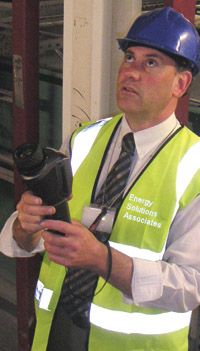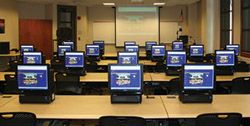Mike Malina, director of Energy Solutions Associates, and an energy auditor, urges schools to forget the green bling and concentrate on getting the basics right first.
It concerns me that a number of schools are making teaching support staff redundant because they have run over budget and are starved of vital resources. Yet schools could do more to make themselves more energy efficient and help reduce these annual budgetary crises.
In my experience the biggest flaw with school buildings is that they are managed by teachers. Now before I upset the teaching profession, I will qualify my position by saying that my wife is a teacher, I'm a parent and I've been a school governor, so I do have a good understanding of how schools work. Teachers should be allowed to concentrate on the education curriculum.

One London school used 45 kW of electricity on Easter Sunday
Ideally, schools should have a building or facilities manager or share a post dedicated to this role over a local area, but so few have the budgets to do this. It would pay dividends for local education authorities to fund these posts as getting control of energy use would ultimately be self financing.
Poor energy performance
The state our current school building stock is poor.
I've carried out many energy surveys on school buildings and they have shown very poor results for energy performance. The buildings have, over time, been poorly managed and suffered from neglect in maintenance and often have very dated building services and poor control regimes.
Some of this is so basic and I'm shocked at the poor state of commissioning and general handover of building services operation.

Mike Malina, director of Energy Solutions Associates
It's a shame that when you tend to read or hear about schools, it always seems to be the latest big new glossy buildings, and how much the government is spending on these. Yet the majority of school buildings are already built and are often antiquated and in desperate need of a comprehensive programme of refurbishment.
The current school building stock was designed for a different model of teaching. Therefore we need an imaginative approach to how we refurbish these buildings and the building services in them. It is often a case that this will be about revamping existing sites often in quite awkward places on occupied sites.
This requires totally different designs and technical solutions to suit modern teaching needs and practices.

These batteries are fitted the wrong way round
Ensuring new and refurbished schools are energy efficient and where possible low carbon adds another dimension to this challenge. We have to consider the basics first, and not become obsessed about funding green bling on buildings. I'm not dismissing renewables because they do have a role for the future, but we need to get the basics right first.
What's important is that the schools environment provides occupants with enough light and fresh air and that the buildings work efficiently minimising the need for energy in the first place.
There is a current trend and there is a danger of schools being encouraged to adopt 'sustainable solutions' because they are highly visible. There are trends in sustainable building often driven by architects for example, 'We're going to have a green roof'', but have they really thought it through?
I have seen that suggested for a number of schools in East Anglia which is the driest area in Britain. All you are going to end up with is expensive bird nesting material!
Money could be better spent on reducing the energy requirement and installing, for example, upgraded HVAC controls, presence detection and infrared controls for lighting, or better insulation.

IT is the curse of modern waste in schools
What is needed is the adoption of an energy hierarchy.
First check the insulation, building controls, maintenance and operation regime.
Then go to the next stage of investing in upgrades and new equipment.
Then renewables can be the icing on the cake, once all the basics have been carried out.
If you are considering something like heat pumps, they could jump the queue in the right circumstances. Photo-voltaics should go last on the list. I am seeing quite alarming projects where they have selected PVs or wind turbines when they could have gone for solar thermal or heat pumps to far better effect to reduce carbon emissions and save money. It's a question of educating the designers and specifiers and explaining the basics.
Controls should be a key factor. Building Energy Management Systems (BEMS) and controls should be used to make life easier for occupants. The key thing is to make the building as intelligent as is feasible and as realistic in its operation as it can be. The educational programme and curriculum is completely different from when many of these school buildings were originally designed and built. Then teachers were still using chalk and the blackboard.
Now the education environment is a lot more sophisticated with large amounts of energy being used on, for instance, PCs and interactive whiteboards which are often left on standby or even fully on.
The alarming fact is that I see some attempts have been made in the past to fit controls in schools but they have ended up being switched off because the occupants didn't know what to do with them. Worse still is the poor state of commissioning and maintenance. Education and awareness is the important thing here. The average school caretaker is looking after the physical side of the building but he, more than likely, hasn't been trained, in how to get the most out of the energy efficiency of the building services in the school. Controls are a classic example. They are so important because if you don't control the building, you are never going to win the battle against energy waste. It doesn't require vast quantities of finance, just some good basic housekeeping.
A whole new emphasis is needed on educating staff responsible for running school buildings, especially as more modern buildings will contain more complex systems.
This is vital and needs to take place urgently. In the 21st Century, being a school caretaker is no longer a mop-and-bucket job.
Mike Malina is also technical advisor to M&E Sustainability, a joint programme of the ECA/ HVCA